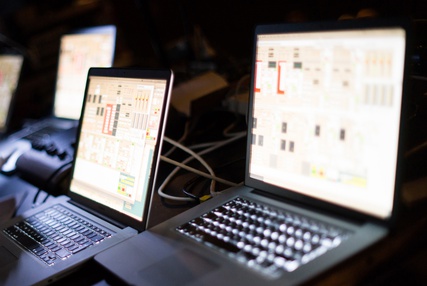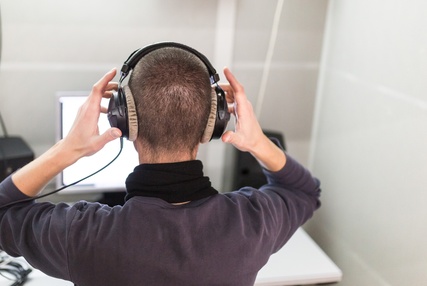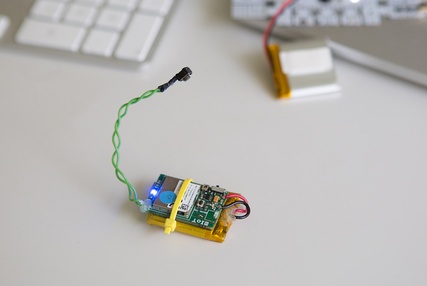10h00- 17h30
Anglais
Initiation
Tarif plein
:
1650 €
Mbre Forum Premium
:
1155 €
Étudiant.e
:
825 €
Dans le cadre de ses recherches sur les processus génératifs, les travaux de l’équipe Représentations musicales de l’Ircam s’incarnent dans la conception de logiciels permettant de composer des dispositif interactifs ou inventer de nouveaux modes d’interaction avec les compositeurs et compositrices, musiciens et musiciennes, improvisateurs et improvisatrices. Grâce à l’écoute artificielle et la synchronisation de signaux musicaux, Dicy2 et Somax2 implémentent des agents intelligents capables d’apprentisage(s) à la volée ou en amont, et d’interactions musicales immédiates ou prédéfinies dans des contextes structurés ou composés.
![]()
Objectifs pédagogiques
À l’issue de la formation, les stagiaires seront capables d’utiliser de manière autonome l’un et l’autre des environnements Dicy2 et Somax2 pour concevoir leurs propres dispositifs interactifs. Les stagiaires pourront continuer l’exploration technique et musicale développée au cours du stage et la mener vers leur(s) propre(s) pratique(s).
Public concerné
Compositeurs, compositrices, musiciens, musiciennes, intermittents, intermittentes, enseignants, enseignantes, performeurs, performeuses, interprètes…
Prérequis
- Maitrise de l’anglais à l’écrit et à l’oral.
- Être à l’aise avec un environnement informatique.
- Avoir une expérience de la performance, de la composition, de l’interprétation musicale. Une pratique de l’improvisation musicale avec un instrument acoustique ou à l’ordinateur est un plus.
- Pouvoir justifier d'une bonne connaissance de Max et de son environnement : pratique et compréhension des tutoriaux de base de Max (Max Basisc tutorials 1 à 11, 14 à 22, Max Data tutorials 1 et 2, MSP tutorials, MSP Basics tutorials 1 à 5, MSP Panning tutorials 1 à 3, MSP Analysis tutorials 1 à 2, MSP Delay tutorials 1 à 3 et 6) ou avoir suivi le stage Max Initiation.
Durée de la formation et modalités d'organisation
36 h, du lundi 15 au samedi 20 décembre 2025, 10h-13h et 14h30-17h30
8 stagiaires maximum
Au cas où elle ne pourrait avoir lieu en présentiel, la formation ne pourra pas être maintenue.
Programme de la formation
Certains détails du programme de la formation pourront être ajustés en fonction des évolutions des logiciels.
Après la première matinée consacrée à l’instruction du contexte général et de l’histoire des compagnons créatifs, les stagiaires exploreront successivement dans les mécanismes et l’utilisation concrète des logiciels Dicy2 et Somax2 (5 demi-journées par logiciel). Ces outils seront abordés à la fois de manière théorique et par la pratique, en binôme et collectivement.
Lundi (Dicy2)
| Matin | Introduction générale : découvrir l’histoire de l’improvisation et des outils de co-performance, compréhension des situations d’interaction dans lesquelles Somax2 et Dicy2 sont utilisés. Dicy2 : introduction à l’environnement et aux concepts clés. Manipulations sur ordinateur : prise en main des tutoriels. |
| Après-midi | Manipulations sur ordinateur : prise en main des tutoriaux, construire ses propres bases de données. |
Mardi (Dicy2)
| Matin | Session pratique en binômes |
| Après-midi | Session pratique : mise en commun et débriefing. |
Mercredi
| Matin (Dicy2) | Session pratique : mise en commun et débriefing |
| Après-midi (Somax2) | Introduction à l’environnement et aux concepts. |
Jeudi (Somax2)
| Matin | Manipulations sur ordinateur : prise en main de l’environnement. |
| Après-midi | Session pratique en binômes |
Vendredi (Somax2)
| Matin | Session pratique : mise en commun et débriefing. |
| Après-midi | Session pratique : mise en commun et débriefing. |
Samedi
| Matin | Évaluation et travail sur les projets individuels. |
| Après-midi | Performance finale et débriefing général. |
Moyens pédagogiques et techniques
- Salle de formation équipée d’ordinateurs Mac mini avec les logiciels, de casques audios, de claviers MIDI et de microphones. Les sessions pratiques seront réalisées dans un studio de l’Ircam.
- Besoins techniques : il est demandé au stagiaire d’apporter une base de sons personnelle pour le travail avec Dicy2 ainsi que Somax2. . Ces sons seront utilisés pour alimenter la mémoire des agents, que l’on contrôle en « pilotant la navigation » à travers des fichiers par l’écoute et la réaction à un flux audio « live ». Toutes les données sont acceptées, qu’il s’agisse de musique personnelle ou de matériaux exogènes. Pour Dicy2, il est recommandé de privilégier des fichiers simples et relativement homogènes, en termes de timbre et de nombre d'instruments. Des pistes monophoniques séparées seront idéales pour facilier la prise en main. Concernant Somax2, il est recommandé que les fichiers soient de préférence en stéréo, d'environ 5 minutes, avec une diversité de timbres et de rythmes.
- Pour les séances pratiques d’improvisation, nous formerons des binômes. Il vous sera aussi demandé d’apporter un instrument, de préférence acoustique, pour la pratique.
- Format de la formation : alternance entre explications théoriques et travaux pratiques.
- Supports pédagogiques : présentations vidéo projetées, supports de cours avec références bibliographiques, documentation des logiciels.
Les environnements disponibles dans l’abonnement Premium ne sont pas inclus dans le tarif de la formation et non fournis à l’issue de la formation.
Suivi
- Accueil le premier jour de la formation à partir de 9h45.
- Contrôle du suivi par la signature d’une feuille de présence pour chaque demi-journée.
- Remise d’une attestation de réalisation intégrant les résultats de l’évaluation.
.Évaluation
- Évaluation des acquis et des savoir-faire sous forme d’un QCM





